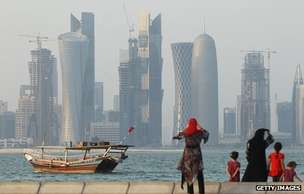
Qatar, a former pearl-fishing centre and once one of the poorest Gulf states, is now one of the richest countries in the region, thanks to the exploitation of large oil and gas fields since the 1940s.
Dominated by the Thani family for almost 150 years, the mainly barren country was a British protectorate until 1971, when it declared its independence after following suit with Bahrain and refusing to join the United Arab Emirates.
In 1995 Crown Prince Hamad bin Khalifa deposed his father to become emir and since then he has introduced some liberal reforms.
Press freedom has been extended and the Qatari satellite TV station Al-Jazeera has become one of the most important broadcasters in the Arab world.
Elections in 1999 for a 29-member municipal council were the first in which Qatari women were allowed to vote and stand for office.
A constitution providing for limited democratic reforms came into force in 2005. The new basic law provided for a legislature – the Advisory Council – with 30 elected members and 15 members appointed by the emir.
The emir says Qatar will hold its first national legislative elections in 2013.
The population is small. Foreigners – including labourers attracted by a construction boom – outnumber natives. Oil money funds an all-embracing welfare state, with many services being free or heavily subsidised.
Possessing more than 15% of the world’s proven gas reserves, Qatar has ambitions to become a global energy giant.
Qatar is active on the regional and world stage, having mediated in disputes in the Middle East and Africa. It is pursuing an Afghan peace deal.












